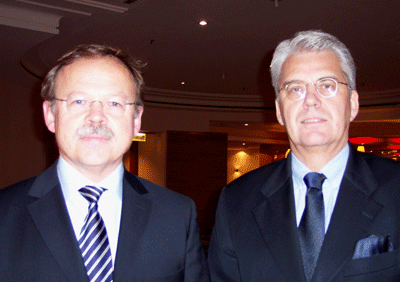 |
 |
|
| |
||
|
Vol. 7 No. 133 WE COVER THE WORLD Wednesday December 3, 2008 |
Q
& A With Pradeep Kumar |
 Emirates
Sky Cargo’s Pradeep Kumar is Senior Vice President – Cargo Revenue
Optimization at Emirates, responsible for Capacity and Network Control Centre,
Revenue Management, Pricing and Yield Management, Revenue Planning and Systems
Development, Global Accounts and Customer Relations.
Emirates
Sky Cargo’s Pradeep Kumar is Senior Vice President – Cargo Revenue
Optimization at Emirates, responsible for Capacity and Network Control Centre,
Revenue Management, Pricing and Yield Management, Revenue Planning and Systems
Development, Global Accounts and Customer Relations. Q:
What impact do you feel from Emirates new Dubai cargo terminal and what
lies ahead for that facility?
A: The
impact is manifold.
Previously, cargo was processed at different
locations in different working environments, which resulted in duplication
of various labor-intense processes, communication gaps, cost inefficiencies,
etc. In addition, with the heavy 6th Freedom traffic connections, ability
to connect and distribute cargo from Dubai in line with the commitment to
customers was a challenge and undermined our efforts to a great extent in
delivering a premium and quality service. Furthermore, the situation had a
major impact on yield and revenue optimization due to our inability to optimize
revenue per position. We can have the best systems – and intentions
– in the world to deliver the best but it all depends on the efficiency,
where the rubber meets the tarmac.
With the move to our Cargo Mega Terminal, processing
of cargo takes place under the same roof and, with state-of-the-art technology,
we have achieved both process and cost efficiencies. We were able to achieve
optimal utilization of the available capacity which gave us an immediate increase
of 35% additional revenue earning capability. We are now offering 'deliver
as promised' commitments and are handling temperature-sensitive perishable
cargo with cool chain options, shock sensitive vulnerable cargo with special
areas for stowage along with all other cargo which require special handling
and storage.
Q: What
is the most important thing to Pradeep right now?
A: To
achieve our revenue objectives for the current financial year.
Q: Can
you elaborate on near- and longer-term prospects?
A: Emirates
is not immune to the turbulence in world economy. Global air freight is often
seen as a barometer of world trade. The traffic contracted in the April-October
period and is likely to slow for the rest of the year before the market stabilizes.
Lower fuel prices, stronger U.S. Dollar, unprecedented government efforts
to battle the global economic crisis as well as the decreased freight capacity
by airlines in recent months will help to boost the air cargo industry next
year.
Q: What
is the impact of the current world situation?
A: Even
though there is doom and gloom in the world economy which impacts air freight,
there are opportunities. We are leveraging our strength in people, technology
and strong network with wide-body capacity serving most of the secondary markets
with one stop and the team is out to make the best of the situation.
Q: What
areas of growth (new markets) do you foresee?
A: Middle
East, Africa and South America.
Q: What
lies ahead for SkyCargo?
A: Emirates
has not slowed down and is going ahead with the acquisition of aircraft in
line with the medium- and long-term plans. The introduction of these wide-body
aircraft into new markets allows us to further strengthen our market position
and deliver customers value for their money.
Q:
Describe new systems or disciplines in force or being implemented that will
build SkyCargo while benefitting the customer?
A: On
Sept 8, 2006 SkyCargo rolled out a state-of-the-art system SkyChain, which
integrates various activities in both commercial and operational aspects of
the cargo business. Starting from stock release to customers, pricing, capacity
management, acceptance of cargo at origin airport, processing at the Hub,
distribution and delivery at destination, data transfer to Finance for processing
and billing, etc all take place in one system. We were able to enforce disciplines
at every level and were able to eliminate unwanted processes, giving us remarkable
process and cost efficiencies.
The system allows us to communicate or receive
messages in any form from customers, service providers and is fully e-Freight
compliant.
Q: What
is your industry view, how should air cargo proceed to realize best practices?
A: IATA's
initiative in implementing e-Freight initiatives is the best direction to
achieve efficiencies at various levels. Managing the business using automation
should be the driver to manage costs. The one who exercises control on the
costs is going to be the winner.
Q: If
there is one thing you could change, what would it be?
A: Change
the focus from revenue management to 'revenue and cost management'.
Geoffrey Arend
Air Cargo Germany Readies Takeoff
 You’ve
got to have guts to airborne two craft as a cargo start-up these days. Michael
Bock and Thomas Homering, former executives at leisure carrier LTU and now
CEO and Managing Director of newcomer ACG Air Cargo Germany GmbH certainly
do see the hazard of the economic downturn but do strongly believe that their
biz plan will work despite some meager times ahead.
You’ve
got to have guts to airborne two craft as a cargo start-up these days. Michael
Bock and Thomas Homering, former executives at leisure carrier LTU and now
CEO and Managing Director of newcomer ACG Air Cargo Germany GmbH certainly
do see the hazard of the economic downturn but do strongly believe that their
biz plan will work despite some meager times ahead.
“We favor a rather conservative financial
path to minimize any unnecessary risks along the road,” Homering states.
The airline intends to deploy two leased B747-400SF
during the second half of January. By then ACG expects to have been conceded
the AOC by the German aviation authority Luftfahrt-Bundesamt.
“Our aim is to grow our business step
by step. That’s why we intend to offer our capacity at the beginning
exclusively to charter brokers,” manager Homering emphasizes.
Negotiations with some brokers are well underway,
he confirms. Next step to come, in April 2009, are scheduled flights both
from Frankfurt-Hahn Airport via Moscow and Shanghai as well as Hahn-Istanbul-Hong
Kong and back.
Hahn Airport was chosen as home base, because
unlike neighboring Frankfurt there are no intentions to impose any night flight
bans. Instead, the airport can be utilized 24/7. Hahn ground services offer
the airlines very fast turnaround times and the recently enlarged runway of
3,800 meters can handle even the biggest commercial aircraft.
“Since we are a newcomer we are a very
lean enterprise that guarantees us some cost advantages compared to traditional
cargo carriers. However, we don’t consider ourselves a discounter but
a cargo airline that offers their clients a quality product for a fair price,”
CEO Michael Bock emphasizes.
Quality is also the key to the name the new
airline was baptized with. “Punctuality, reliability, security and quality,
those are main attributes the global markets associate with German produce.”
“As ACG Air Cargo Germany we intend to
service our customers in the very same manner,” Homering states.
According to both managers there is enough room
for a second national air freight carrier in Germany.
“We have talked to many agents lately
and they told us that they would prefer having a choice between two German
capacity providers for flying their goods,” claims CEO Michael Bock.
By possessing the majority stake he is ACG’s
real boss. Minority stakeholder is Dublin-based City Leasing Ltd. The management
team is complemented by a former troika of Aeroflot Cargo, among them Andrey
Goryashko, once SU Cargo’s General Manager, further Alexander Kirichenko
and Alexej Prikhodchenko.
“We hired them because of their excellent
market connections and their exceptional insights of the international forwarding
scenery,” Homering explains for bringing them on board.
The two leased Boeing aircraft B747-400SF belong
to Icelandic Avion Aircraft Trading that purchased them from Taiwanese China
Airlines and had them converted in Israel by IAI-Bedek.
Up to now about 15 licensed B747 Captains and
First Officers have signed contracts with ACG. A total of thirty are needed
for keeping both jumbo freighters permanently in the air.
According to Homering, “the pilot market
has eased quite a bit as a result of the economic crises and the struggle
for some airlines are contending with to survive.”
To get sufficient basic loads ACG is eager to
have as many blocked space agreements as possible to be signed by forwarders.
Says Manager Bock: “Not only do we appreciate
having pacts with big agents but also welcome commitments by any smaller forwarder.”
Meanwhile, sales agent ATC Aviation Services
has been appointed by ACG to act as their GSSA in Germany, the Netherlands
and Switzerland for exclusive marketing of the main and lower deck space of
the B747-400SF that is not blocked by capacity purchase agreements.
Heiner Siegmund
An
Air Cargo News/FlyingTypers Original
Our
exclusive series “Women
In Air Cargo” asks our readers to send some words and a
picture about somebody that you know who is female and has made a
difference in air cargo.
|
|